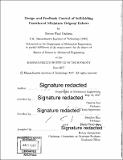| dc.contributor.advisor | Daniela Rus and Sangbae Kim. | en_US |
| dc.contributor.author | Guitron, Steven Paul | en_US |
| dc.contributor.other | Massachusetts Institute of Technology. Department of Mechanical Engineering. | en_US |
| dc.date.accessioned | 2017-10-04T15:07:13Z | |
| dc.date.available | 2017-10-04T15:07:13Z | |
| dc.date.copyright | 2017 | en_US |
| dc.date.issued | 2017 | en_US |
| dc.identifier.uri | http://hdl.handle.net/1721.1/111759 | |
| dc.description | Thesis: S.M., Massachusetts Institute of Technology, Department of Mechanical Engineering, 2017. | en_US |
| dc.description | Cataloged from PDF version of thesis. | en_US |
| dc.description | Includes bibliographical references (pages 145-158). | en_US |
| dc.description.abstract | Small robots that can be manufactured rapidly and inexpensively have numerous scientific applications. Current manufacturing processes for robots are made specific to the robot, with little application beyond the shape and size of the target robot. The idea of magnetically-controlled, self-folding origami robots has been proposed to enable universal robot construction on this scale. This thesis continues the investigation into miniature magnetic origami robots by exploring specifically the design and control of such robots. We detail our heat-activated self-folding process and its thermal constraints. We further explore design principles for robots using this self-folding strategy, culminating in the design and performance of an untethered, walking, swimming robot. We develop a control method for the robots utilizing a novel electromagnetic coil system that does not enclose the workspace of the robot. We model the magnetic field of the robot and the generated field from the electromagnetic coil system, and we explore their influences on the frequency and speed response of the robots due to induced motion. We develop a manual and autonomous controller to drive the robot through oscillitory walking motion. We develop a novel method of localization using Hall effect sensors to enable position feedback control as well as vision-based localization and path planning. Finally, we examine magnetically-controlled assembly using special exoskeleton robots as well as medical applications within the gastrointestinal system. | en_US |
| dc.description.statementofresponsibility | by Steven Paul Guitron. | en_US |
| dc.format.extent | 188 pages | en_US |
| dc.language.iso | eng | en_US |
| dc.publisher | Massachusetts Institute of Technology | en_US |
| dc.rights | MIT theses are protected by copyright. They may be viewed, downloaded, or printed from this source but further reproduction or distribution in any format is prohibited without written permission. | en_US |
| dc.rights.uri | http://dspace.mit.edu/handle/1721.1/7582 | en_US |
| dc.subject | Mechanical Engineering. | en_US |
| dc.title | Design and feedback control of self-folding untethered miniature origami robots | en_US |
| dc.type | Thesis | en_US |
| dc.description.degree | S.M. | en_US |
| dc.contributor.department | Massachusetts Institute of Technology. Department of Mechanical Engineering | |
| dc.identifier.oclc | 1004850359 | en_US |
